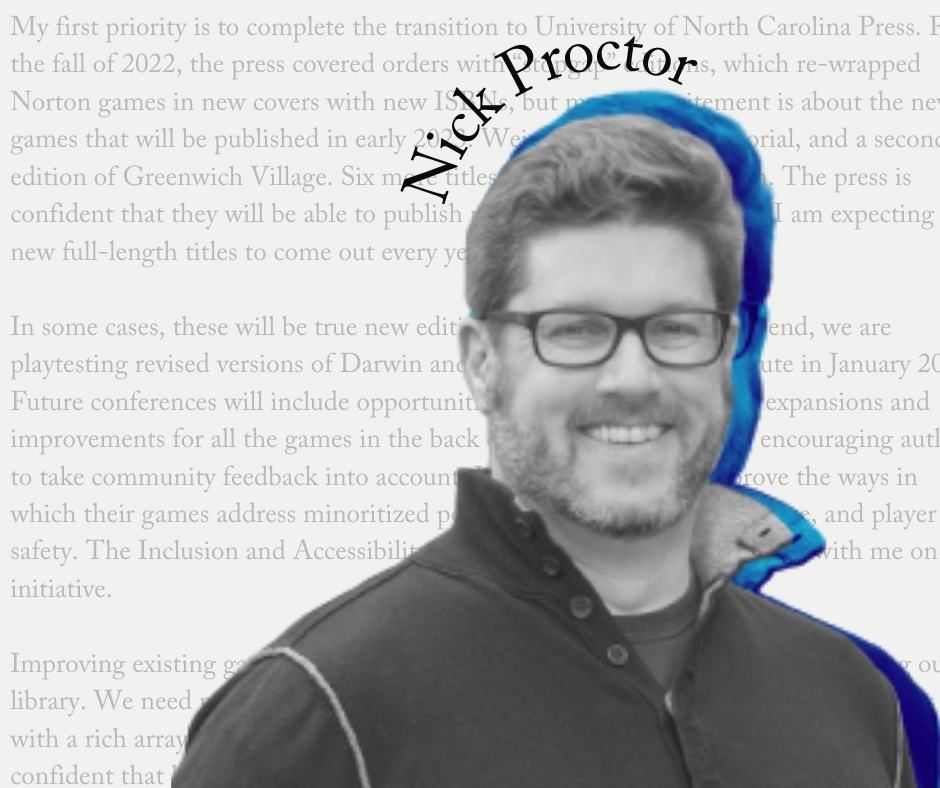 HELLO EVERYONE –
HELLO EVERYONE –
Coming off many years as the chair of the Reacting Editorial Board, it is no surprise that my first set of priorities involves game development and publication.
UNC-Press Transition
My first priority is to complete the transition to University of North Carolina Press. For the fall of 2022, the press covered orders with “stopgap” editions, which re-wrapped Norton games in new covers with new ISBNs, but my real excitement is about the new games that will be published in early 2023: Weimar, Vietnam Memorial, and a second edition of Greenwich Village 1913. Six more titles are queued behind them. The press is confident that they will be able to publish new games at a tidy clip, so I am expecting 5-6 new full-length titles to come out every year.
New Editions
In some cases, these will be true new editions of older games. To this end, we are play-testing revised versions of Charles Darwin and Indian Independence, 1945 at the Winter Conference in January 2023. Future conferences will include opportunities to playtest and preview expansions and improvements for all the games in the back catalogue. In addition to encouraging authors to take community feedback into account, I am asking them to improve the ways in which their games address minoritized and marginalized populations, issues of social justice, and player safety. The Inclusion and Accessibility Committee of the Reacting Consortium Board is working with me on this initiative.
Expanding Our Library of Reacting Games
Improving existing games is good practice, but we also need to continue expanding our library. We need more good games about more important topics set in diverse locales with a rich array of roles. With Kelly McFall as interim chair of the Reacting Editorial Board I am confident that he, the REB, and the volunteer reviewers will continue to shepherd a variety of games through toward eventual publication.
More Short Games and Microgames
In addition to expanding the full-length flagship library, we need more short games. Developing and distributing short games should serve the community, create a new base of users, and provide additional income without overtaxing our resources. To this end, I spent the first half of 2022 working with a small team to develop a framework for designing and developing games with 2-3 sessions of gameplay. One of the biggest questions that we asked ourselves was, “what makes a Reacting game a Reacting game?” We broadly agreed that the clash of ideas must take center stage. The team, ably led by Ray Kimball, created a report, which was presented at the GDC in July. The REB and RCB are now considering the implications of the report, with particular attention to game development and possible methods of distribution. Hopefully, these guidelines will be ready by the end of 2022.
The same team discussed developing an official outlet for games that only have one session of gameplay. We called these “microgames,” although in the broader community of gaming, they would probably be classified as “parlor larps.” We currently host several of these on our website even though they are very different from other Reacting games. The team decided that although these are useful for our community, we lack the infrastructure to develop them. Consequently, the team proposed that their development should perhaps be shifted to a collaborator (like Central Michigan University Press, Experiential Simulations, or 42Ed). Our community will continue to play and discuss these games, and we will link to them through our website, but they will not officially be Reacting games.
Reacting in High Schools
In addition to developing new games, I hope to find new ways to aid high school instructors who use our games. This summer, we launched a Discord server for high school instructors. We are hoping to build on this by working with others to host a conference focused on using the Reacting to the Past pedagogy in high school some time in 2023.
Events and Programming
This relates to ongoing conversations with Jenn Worth and Maddie Provo to figure out the right balance between face-to-face conferences and online programming. We should capitalize on the expertise that we have built with online programming, but we must do so without overwhelming our limited staff. In addition, even though online conferences are affordable, in-person conferences are immensely helpful for community building. All this means that we anticipate holding an in-person Summer Institute at Barnard in June of 2023.
Community-Building and Diversity
When thinking about community building, my thoughts turn to diversity. While we are diverse in terms of institutional affiliation, faculty rank, and academic discipline, but there is an obvious and pressing need to increase our ethnic diversity. At present, we are taking two major steps in this direction. First, for the upcoming Winter Conference we are working with the University of Georgia, Athens, to subsidize the attendance of faculty of color. Second, I am working with the nominations committee of the RCB to find ways to increase the diversity of our governing bodies. If you have a great idea for what should be third on this list, please let me know. This is an area in which I hope to be listening as much as telling. Maybe more.
Financial Stability
Finally, I hope to improve the financial stability of the Reacting Consortium. This will require growing existing income streams as well as increasing their number. Fortunately, Mark Carnes has agreed to lead our efforts to secure grants. Little did he know what awaited him when he stepped down at Executive Director! Under his guidance, we currently have three teams of scholars working on grants from different institutions.
This is an exciting time for the Reacting community, and I am honored to have the opportunity to be a part of the continued growth of this special group of scholars and educators. I look forward to the work to come.
Nicolas W. Proctor
Executive Director
Read Kelly McFall's Editorial Comments here, and watch Beth Wightman's interview of Nick and Kelly here.


